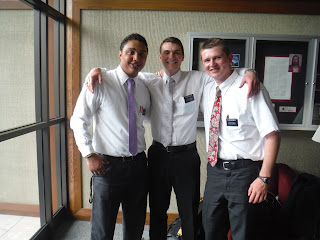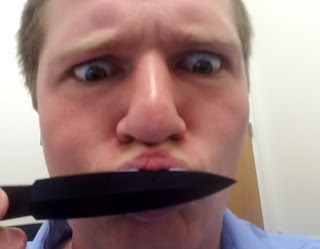17 Hard and Soft Skills I Got as an LDS Missionary That Make Me Extremely Hireable
Should I Put my LDS Mission on my Resume?
I put my LDS mission on my official resume, and on my LinkedIn account. It's not because I think my religion is inherently better in the business world. Some might make that claim, but I'm not that pretentious. The reason I put it on there is because of the things that I did that transfer to the business world. People who have served the LDS 2 year, or 18 month mission understand the level of work that goes into serving a mission, as well as the hard and soft skills you develop while you're there. Now, every missionary and mission is different, but below is a list of 17 skills that every missionary has the opportunity to develop on their mission, skills that are very valuable in the workplace.
Bonus possibilities: office experience, experience managing a fleet of vehicles, used social media professionally, or the ability to speak multiple languages.
Returned missionaries, share this on Facebook and LinkedIn so employers know just how valuable your experience is! Also, drop a comment below of where you served! I'll start it off by saying, I served in the Oregon Portland Mission. Also, if I missed any other skills, please comment those below too!
1. Hard work
I was never more tired than I was on my mission. The mission has a rigorous schedule. We start with our assigned tasks at 6:30 in the morning, and our assigned tasks end at 9:30 at night. Most days I would put about 10 miles on my bike, and/or walk 3-5 miles. We walked doors, and tried to keep our schedules full of appointments. The missionary planner is broken up into 30 minute segments. We wanted to have something planned for every one of those segments.2. Dedication
I knocked doors in the snow, rain, and in summer heat that was over 100 degrees. I woke up by 6:30 every day. It wasn't always fun, but I believed in what I was doing, and I was willing to act accordingly.3. Goal setting
I set goals every day of my mission. We set goals for how many people we wanted to talk to, literature we wanted to give away, and people we wanted to see. We set weekly goals, and even monthly goals. Our mission as a whole had yearly goals, or quarterly goals that we were working to achieve. We got really good at setting, not just S.M.A.R.T. goals, but goals that were bordering on beyond that, and we pushed ourselves to achieve them.4. Strategic planning
Not only did we set goals, but we had daily and weekly planning meetings to figure out how to accomplish these goals. As I mentioned before, we made plans for every 30 minute segment of our day, and then we made back-up plans for all that same period. We experimented with different techniques to figure out what worked. We had to adapt, because we served in multiple areas, and each area had its own challenges and opportunities.5. Sales skills
Technically we didn't have anything for sale, but we were trying to get people to change their whole mindset, their way of life, stop smoking, drinking, or using drugs, and learn to love people the way Jesus loves them. Maybe I'm biased, but that's a whole lot harder than selling pest control.6. Talking and working with anyone:
This is tied with having good sales skills. I can carry on a conversation with a homeless man, or a person with a theology degree. Rich, poor, black, white, I've talked to everyone. I talked to the person on the street that your mom thought looked scary. I talked with people who looked friendly. Because of this, I can work with anyone.7. Language skills
This goes along with being able to work with anyone. I tried to communicate with people who spoke dozens of different languages. Many missionaries are assigned to learn a foreign language, and teach people in that language. I was an english speaking missionary, but I learned enough to be able to get them literature in their language, and usually to find them a missionary who spoke their language. We wanted to be able to work with everyone, so I picked up some Spanish. Not every missionary can, or did learn a foreign language, but many do. If nothing else, we learned how to have a conversation.8. Leadership:
Missionaries are grouped in partnerships. There is always a senior companion or partner who is supposed to take the lead. There are also district leaders, and zone leaders, and training leaders, and office missionaries. There are also a few missionaries who work as administrative assistants to the mission president. In some areas, missionaries lead the entire congregation as a branch president. Every missionary I know of has held a leadership role.9. Presenting a good image
Every day for two years I took a shower, shaved, and put on a white shirt and a tie. I frequently had a suit jacket to go along with that. In the missionary handbook, it has very strict dress and grooming standards. There were standards on everything from our hair, all the way down to keeping our shoes polished. This might sound a bit militant, but missionaries look good. Beyond that, missionaries are heroes in the eyes of the LDS members, especially the LDS children. As missionaries, we relied on members for help in so many areas. We couldn't afford to upset them.10. Teamwork, cooperation, compromise
As I mentioned above, we work with members for almost everything. They cut our hair, made us food, helped teach people, helped us find people to teach, and so much more. We had to work with different organizations in the church, including boy scout and girl scout groups, to help get people involved and included. We also had to work with other missionaries.11. Working with someone you don't like
Missionaries are assigned to be with their companion missionary 24/7. We also don't get to pick who our partner will be. Even if you were with your best friend for 24/7, there's going to be friction. We learned to deal with it. Missionaries can be assigned to work with someone they don't particularly like, and be with that partner between 6 weeks, to 4.5 months (my longest) or longer.12. Patience
If you work with people, you need patience. Missionaries do nothing but work with people, from their mission companion, to church members, to people in the community. I've worked to help people quit addictions. That requires patience. I've had doors slammed in my face and been cussed out in dozens of languages. That takes patience. I've had things thrown at me out of cars while I was on my bike. Patience. We have people cancel appointment after appointment, and we still try to meet with them and work with them. Basically, if you didn't have, or develop patience as a missionary, you didn't survive the experience.13. How to give effective training
We were assigned to take turns teaching different districts, groups of 8-16 missionaries, how to do different parts of missionary work. We learned how to teach our peers. In my mission we did training on everything from the lessons we taught, to technology, to goal setting and planning training, and everything in between.14. How to run a meeting
I went to multiple meetings every week, and I ran some of them. I didn't love meetings. In a week, we had a district meeting, a ward council, Priesthood Executive Committee meeting, and a missionary coordination meeting. Other meetings that happened, not weekly but regularly, were zone conferences, stake president committee meetings, mission leadership conferences, and private meetings with leaders of men's and women's organizations within the church. Although all of these meetings started and ended in a prayer, we know how to create an agenda and move a meeting along. We've seen enough bad meetings that we have an idea as to how to make a meeting better.15. Thrift
We were given $125 per month for food. Some missionaries get more, and some get less. That equates to 25 $5 taco bell boxes. We learned to live on that (the $125, not taco bell). You learn to be frugal, or be hungry. Many missionaries also pay for their own mission. They save their own money while growing up in order to be able to afford it.16. Giving back to the community
Whether you believe in the message of the LDS church or not, missionaries put in a lot of service hours in a week. I loved it. There was one week in particular where I remember a project helping an older gentleman (not Mormon, or even interested) rebuild a fence, we did some construction projects, we did a highway cleanup project, we removed a lot of blackberry bushes, I worked at meals on wheels, soup kitchens, boy scout groups, art and cultural events, and more, all on a volunteer basis.17. Ability to be off their phones
When you first become a missionary, you go to the Missionary Training Center. You don't get to take your phone. I could feel phantom phone vibrates in my pocket for weeks. In the field, missionaries get to use a phone, but they learn not to be as reliant on it as many people are today. We learned to use it as a tool.Bonus possibilities: office experience, experience managing a fleet of vehicles, used social media professionally, or the ability to speak multiple languages.
Returned missionaries, share this on Facebook and LinkedIn so employers know just how valuable your experience is! Also, drop a comment below of where you served! I'll start it off by saying, I served in the Oregon Portland Mission. Also, if I missed any other skills, please comment those below too!



Comments
Post a Comment